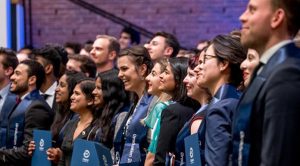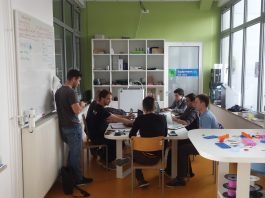Willem Jonker, CEO of EIT Digital, talks about the lack of digital skills in Europe and how this challenge can be overcome.
According to the latest Digital Economy and Society Index (DESI), four out of ten adults in the EU lack basic digital skills. More than 70% of business report the lack of staff with adequate digital skills as an obstacle to investment. Europe also faces a shortage of digital experts who can develop cutting-edge technologies for the benefit of all citizens
EIT Digital – Europe’s leading digital innovation and entrepreneurial education organisation – recently signed an agreement with the European Investment Fund to allow more European students and learners to benefit from EIT Digital’s training programmes. The Innovation Platform spoke to the organisation’s CEO, Willem Jonker, about some of the main challenges facing Europe in terms of this lack of skills and, indeed, how they can be overcome.
As a key player in entrepreneurial education, what are the main features you observe in terms of education?
If you look at the situation in Europe, there is a clear need to improve on digital skills. It is both that we lack digital experts – so a lot of companies cannot recruit the personnel they need to support their digital transformation – and that the existing workforce in general does not really have the additional digital skills needed to pick up the job.
There is a general lack of digital experience. So, large groups in the European Union still have difficulties in mastering the complexity of interactions with businesses and governments when it comes to online. And that means that there is also a general need for upskilling, for making sure that we have an inclusive society where more and more services are offered in a digital way, in which the population is able to keep track of that in the whole of Europe.
Four out of ten EU adults really lack the skills to truly master digital applications. They need support from other people, they have difficulties in completing online forms, they have security issues, they have upgrading issues with software and so on. That number is actually quite high. If you look at business, then more than 70% of them report lacking staff with adequate digital skills.
That is mainly where Europe stands, and this is something that is recognised within the European Union. There are digital education plans being developed, there is support from different European institutions, and, of course, we as EIT Digital play our part. There is also recognition at a national level, although the approach is still pretty fragmented. And there is also competition going on between the different countries when it comes to, for example, labour requirements and preferred positions for highly skilled digital experts that certain countries offer, including tax reductions. And Europe would benefit from a more uniform approach, and teaming up, because it is a need that is widespread across Europe.
Content wise, that means that programmes need to anticipate the labour needs. What would be the main routes for improvement, based on the overview you have?
Well, it starts with an understanding that education is a lifelong process. And although the tools are available to further develop yourself by, for example, online programmes, post-academic education programmes, or specific training programmes offered by companies, you still see that it is not a generally accepted way of working for people to train themselves to ensure they keep up to date. Of course, they follow programmes within their company, and some may undertake additional online courses – indeed, this is something that is increasingly being seen on resumes, particularly amongst the younger generation. But at the same time, you still don’t see an overall culture of lifelong learning, and so that is a cultural aspect that needs to be addressed. And, of course, all kinds of institutions can help; universities could be more open to support it and companies could give more room to let it happen, but it is also down to personal responsibility.
The other element is the kind of skills that are needed. In digital, of course, there are deep technical experts needed to develop the next generation of communication technologies, like 6G, and experts that are deep into Artificial Intelligence or cybersecurity. At the same time, there is an increasing need for people that are able to apply digital technologies in business or government settings as a supporting or integrated tool, and that requires a more T-shaped expertise. It requires skills to understand business processes, to see the value of technologies, to be able to generate value and not see digital as a back office cost. That requires a broader skillset, and that is also something that we try to address in our programmes.
COVID-19 highlighted the fact that in some universities have been offering students quite poor equipment. Do you feel that university and schools should propose more dynamic and up to date experiences for online training and education?
If you look at the universities, the majority of their offerings are focused on Master and PhD education and, of course, universities also participate in post-academic programmes and professional education programmes. At the same time, you see that it is not mainstream for them, so they sometimes do it in bilateral collaborations with businesses and so on, and that requires a different way of teaching; teaching the protocols for communication in a classroom course to Master students is very different to explaining the value of blockchain technology to bankers, for example. This is the reason that this market is less structurally developed. Master education is very well standardised across Europe and almost worldwide, and universities have a long history and well-established programmes and degrees; they also have ranking systems and quality systems; it is all there. In professional education, however, there is far less.
In professional education there is often the desire for a kind of micro certificate that confirms the work has been completed and also that the qualification is universally recognised. So you can, of course, obtain these from your company or have them connected to certain tools, but there is perhaps also a need for certification that is more or less comparable to what a university degree provides, and that is something that could be further developed by the higher education institutes, because they know how to run these certified, well-recognised diplomas and they could use that expertise to build something that is more tailored to the needs of professionals who want to upscale on certain aspects but are not interested in following a one or two year curriculum.
EIT Digital is working with more than 20 universities in Europe. Are there any role models that we should learn from, or that are more advanced?
In Europe, there can often be significant differences between universities. It depends on the university culture itself, and also sometimes on the national culture. You could say that it is even, to some extent, dependent on the European culture, which is different to what we find in Asia or the US.
When you look at something like entrepreneurship, however, this is something that is increasingly on the radar of European universities generally. It is a lengthy process but gradually we are seeing that universities are starting to show more interest in entrepreneurship for the valorisation of the results. They have started to build incubators, for instance, and they have really begun to stimulate students, building elements of entrepreneurship into their curriculum. That is not the case everywhere, of course, but the point remains that universities should consider their core business as research and education, with valorisation being the third element but something that, as yet, is not as solidly embedded in university infrastructure.

It is here that EIT is acting as an agent of change, because rather than building on the two pillars of research and education, from its inception EIT took the triangle as a basis – education, research, and business. We focus on ensuring that we have the right students with the right entrepreneurialism mindset, but also that we have the right research results coming to the market. To return to the aforementioned point about culture: this is something that differs between Europe and the USA, for example, and while the research taking place in Europe is arguably better than that in the US, the latter is faster at bringing things to the market, it has more instruments, and it puts more power behind that part of the story. It is here, then, that Europe could step up.
That is also where we at EIT and EIT Digital are focusing – on helping universities build that business triangle, to really be a strong player not only in research, but also in innovation. And, of course, you cannot do that on your own; you have to do that together with investors, you have to do that in ecosystems, you need market parties that want to take up the results, but you also have to make sure that the results are embedded in a way that it can be operated in a commercial setting, and that very often means you have to create a spin out company, and you need to have products in that company that can be sold. The company must have freedom to operate and you also have to fuel the growth of that company both through customers and through investors. Some universities are quite advanced in having that in place, but there are also a lot of universities that can definitely improve.
On 28, April, EIT Digital and the European Investment Fund signed an agreement that will allow students to benefit from EIT Digital’s education and training programmes thanks to a new EIF guarantee. Can you tell me more about this?
The importance of this was demonstrated by the people who took part in the signing ceremony. All of us are, at the top level, convinced that digital skills education is critical for the development of Europe.
It is also very good to see the importance that instruments which you would at first thought connect to finance are investing in education. That means these institutions clearly understand that building successful business is not only a matter of having the financial resources, but also a matter of having human resources, in order to make sure we have the right, well-trained people available to grow companies and to make them competitive at a global level.
We are teaming up with EIF but to expand this to education is, for me, a significant additional step, completely in line with what we, as EIT Digital, see as our core business: no innovation without education, and that is what makes this collaboration so important. And although, in financial terms, it is only a small step, it has much bigger implications and it also gives a very strong signal to the investor world that there is a need to invest in education. We need the experts and we need the skilled talent to drive these companies.
Could you comment on some of EIT Digital’s student success stories?
This shows that EIT Digital’s education programmes are delivering on what they are designed for – delivering people with the entrepreneurial mindset. The Hungarian Master student story, Peter Lakatos, is really a great one. While they were doing their studies, they were already taking part in competitions and were very successful. They won the big EU Against Virus competition, which led to them being picked up by the EIT Digital Innovation Factory programme. They are now rolling out their technology in pilot projects.
Xin Hu is also an absolutely great story. Coming from China, Hu chose a European education programme when he could have gone anywhere in the world; he established his company here, refused an offer from the US to sell it, and went on to build it up very successfully. He then started another company as well, so he really does have a serial entrepreneur mindset.
Wilfred Dron is also very successful. He recently signed up another collaboration this week, and from his PhD work on battery usage and the modelling of battery usage and energy consumption in circuits, it is clear that he has hit a very critical element. This led him to the offices of Apple to discuss his solution with them. This demonstrates world class technical work and a world class entrepreneurial mindset to do something with this technology and bring it to market.
It is also a pleasure to see people that maybe be not directly from our education programmes but who have nevertheless worked very successfully with us, such as companies like Konux that are doing very well. Konux started off with our challenge finals in 2013 and recently collected an investment of €65m. That is, of course, great to see, and is also stimulating for the others, too. Andreas is always prepared to give back to the ecosystem and the community and to support activities and tell his story. Damiano is a similar example. His company, SecurityMatters, was struggling to find investment at the national level, but with our help they obtained it from Germany. Then, just a few years later, they saw an enormous multiplier on the value of the company when it was acquired by Forescout. These are the kind of people we have in our ecosystem, and they exemplify the spirit and mindset we are trying to foster.
Achieving change is something that never ends, and so our work must continue; the rest of the world will not be taking a break, so neither should we. That is why I am happy with the continuous support for EIT in the New Horizon Europe programme, although I believe that the ambition should have been higher. That being said, it is good that the results are being recognised, as is the triangle of ecosystem, innovation, and education, which is at the heart of the EIT and which is where you connect research, business, and education.
To conclude, if you had one short message to address parents and future students who want to build the world of tomorrow, what would you tell them?
My advice would be to prepare yourself for a continuous learning and development journey. Obtaining diplomas is just a step on that journey, not the end goal. Second, I would tell them to make sure they are always well-grounded, with one leg in society and business, and another leg in innovation, education, and research in order to ensure they build a connection between those two worlds, because that is what we need.
The next generation of students to emerge from our programmes will have this in their DNA, and we need many, many more people to have the same outlook. People must also understand that innovation is not a linear, top-down waterfall model. Innovation is exploration; it is a journey, it is iteration, it is circles, but, of course, it is always driven by opportunities and what we can offer to address the needs that we see in our society.
Willem Jonker
CEO
EIT Digital
info@eitdigital.eu
Tweet @EIT_Digital
www.eitdigital.eu
Please note, this article will also appear in the sixth edition of our quarterly publication.











